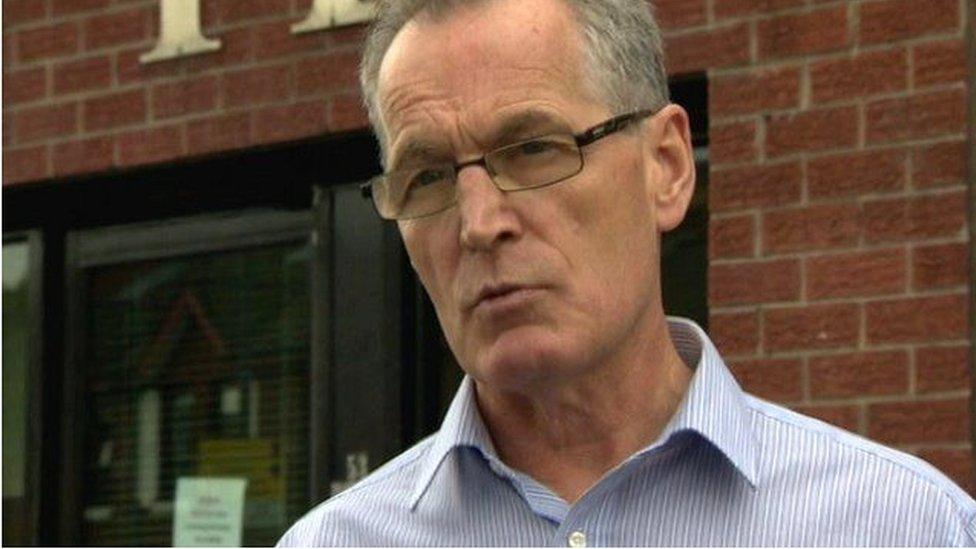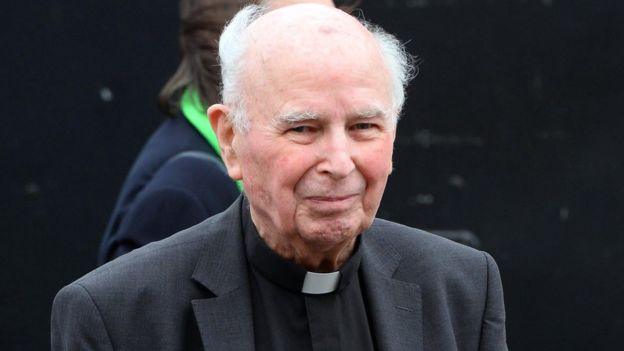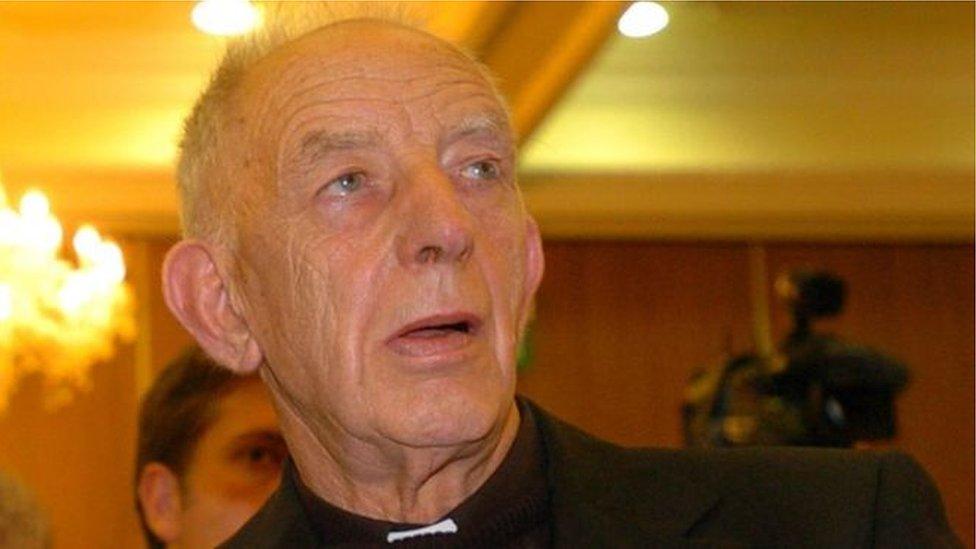Sinn Fein's Gerry Kelly 'extremely dangerous' according to 1980s government file
- Published

Gerry Kelly, now a north Belfast MLA, was described as a 'continuing escape risk'
Sinn Fein's Gerry Kelly is described as an extremely dangerous and dedicated terrorist in a newly-released government file.
A series of documents from the 1980s reveal the Northern Ireland Office's attempts to promote political dialogue against a backdrop of continuing IRA and loyalist violence.
They cover events in the 1980s running up to 1989.
The files come from the Public Record Office of Northern Ireland (PRONI).
They have been released under what is known as the 30/20 rule, which refers to the phased release of files that used to be kept secret for 30 years but will in future be released after 20 years.

The late bishop Edward Daly was identified as someone who could influence SDLP leader John Hume
With IRA bombs exploding and frequent loyalist murders, the men of violence appeared to be setting the agenda in the 1980s.
But the files reveal tentative efforts to get talks underway.
The British government was concerned that John Hume did not seem convinced by its attempts to convene cross-party negotiations.
Officials identified the late Bishop Edward Daly as someone who could influence the SDLP leader and might act as a message bearer.
Representatives from the parties - including the DUP's Peter Robinson - met in secret in Duisburg, Germany in 1988.
The files show that Northern Ireland Office Minister Brian Mawhinney thanked the organiser, a German clergyman called Eberhard Spiecker, at a meeting four months later.
Historian Eamon Phoenix said that the official report of the meeting showed that the government regarded Dr Spiecker as well meaning but harboured doubts "as to how much he really knew about the Northern Ireland political scene".

Fr Alex Reid was revealed to be the fifth man involved in the 'Duisberg proposal'
However, Dr Spiecker summarised the "Duisburg proposal" as a break in governmental meetings connected to the Anglo-Irish Agreement, which unionists had demanded, while acknowledging that so far as the SDLP was concerned "there must be a chance of an all-Ireland dimension".
Dr Spiecker confimed to the minister there had been a fifth person involved, who he said had a difficult role to play - representing the views of the republican movement, but remaining acceptable to the unionists.
The file does not name this fifth man, but subsequently he was revealed to have been the late Redemptorist priest Alec Reid.
'Success'
The newly-released files contain a report on the Dutch extradition hearing for two IRA Maze escapees, Gerry Kelly and Brendan "Bik" McFarlane, which took place in 1986.
A Northern Ireland Office assessment describes Gerry Kelly, now a North Belfast MLA, as "an extremely dangerous, resourceful and dedicated terrorist... (who) presents a continuing escape risk".
The secretary of state had to invoke a Royal Prerogative of Mercy because some of the men's offences were not extraditable.

Sir Ken Bloomfield, then head of the NI Civil Service, described west Belfast as having a 'ghetto mentality'
But, when the men were due to be returned, an official concluded that the case had "clearly been a success for HMG (Her Majesty's Government)".
"It will be the first time that terrorists have been extradited from a foreign country to NI," he added.
Throughout this period the government struggled with how to address deprivation in areas like west Belfast, where Catholic male unemployment was running at 47%.
Dr Phoenix came across one strongly worded document from April 1987 written by Sir Ken Bloomfield, the head of the Northern Ireland Civil Service.
Difficulties
Sir Ken spoke of west Belfast's "ghetto mentality" and alienation "from normal civilised behaviour".
He feared that if the government engaged in efforts to regenerate West Belfast, unionists might respond "on the lines of "do you have to kill British soldiers... to benefit from a cornucopia of assistance?"
Despite these concerns, the government signed off on a major development programme for deprived areas in Belfast in 1988.
Several documents refer to the government's difficulties combating the influential MacBride principles, an anti-discrimination campaign in the USA that acted as guidelines for US companies doing business in Northern Ireland.
Secretary of State Peter Brooke wrote to cabinet colleagues that the implementation of what he called tough and radical new fair employment laws would be crucial to the success of the government's Northern Ireland policies and to perceptions abroad, especially in the United States.